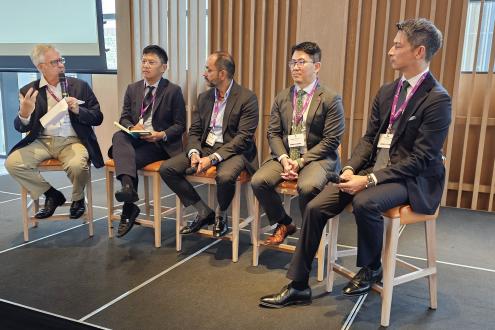The Role of Life Insurance Solutions for Family Offices in Expediting Wealth & Legacy Planning

Sep 18, 2023
Family offices are growing in number and often in scale in both Hong Kong and Singapore, with both centres fighting hard (but fair) to appeal to UHNW families from the region as well as globally who are considering where to establish their Single-Family Office (SFO). The Hubbis HNW Insurance Forum in Singapore on September 6 opened with a panel of experts debating the role of family offices in consolidating control, coordinating family wealth and planning, and expediting more robust family and family business governance. This panel discussion was not focused on the nitty gritty of the policies and structures themselves, but more on contextualising insurance within this big-picture perspective on family offices. The mission was more around the experts highlighting the value of life solutions as part of a robust estate and legacy planning approach and as a core product that aligns with the family’s missions and the technical aspects of 360-degree structuring. Insurance in any of its guises needs to be seen as a risk management and risk mitigation solution for these families, which are often immensely complex and very global in their businesses, assets, investments, residences, and outlooks. The panel also touched on the best approaches for the private banks and wealth managers to discuss these issues with clients, and how they can work with the leading insurance brokerages, with preferred lawyers, accountants and fiduciary services experts to help deliver life solutions that ideally tailor into the client’s personal and family estate & succession structuring.
Chair: Peter Triggs, Partner, 1291 Group
Panel Members:
- Lee Woon Shiu, Managing Director & Group Head of Wealth Planning, Family Office & Insurance Solutions, DBS Private Bank
- Sze Kuan Sim, Of Counsel, RHTLaw Asia LLP
- Philipp Piaz, Partner, Finaport
- Rohit Ganguli, Head of Wealth Planning Asia, EFG Bank
Key Selected Insights & Observations
The Family Office and its evolution in Asia – the mission to manage the family and its wealth from a 360-degree perspective
A speaker observed how the concept of the family office has come into Asia from Europe and the US as vehicles for UHNW families to manage their wealth in a more deliberate and centralised manner. He said from his perspective having been closely involved in a family office for many years, it must fulfil two major roles – helping the family manage their business and wealth, and number two, helping them manage the family itself.
“Both are equally important,” he stated. “The first element is more technical and structured, the second element more nebulous perhaps, and not so easily dealt with. And in my experience, external advisors of all types tend to focus on their core specialities, whether banking, investments, finance, trusts, structuring, legal structuring, and so forth and tend to pass over these ‘softer’ elements.
He said that from a holistic point of view, what the families really need is a close and trusted advisor able to understand or help the client understand a comprehensive, multi-faceted picture of what their universe looks like, where resources are to be deployed, and where each of the advisors’ inputs can fit into the overall picture.
He offered a short example. “From time to time, counterparties, private bankers, and advisors will ask me to speak to some of the younger generation of families who have questions on the role and missions of a family office,” he said. “And I will paint a picture of what the family office looks like, how it can help to bridge the gap between the family business and family governance structures, and how to facilitate the most effective communication.”
The Family Office should be viewed as the inter-generational hub for family longevity, cohesiveness and effective wealth management and estate transition
“The discussions we have with family offices are wide-ranging, focusing on wealth and estate planning missions,” a banker explained. “The family office is a very powerful vehicle to expedite these matters and to coordinate key objectives for the family around the next generations and the management of family wealth, estate and business succession, and so forth.”
He explained that their firm had been refining its approach to these clients and these issues, working through a structured evolution of these discussions, resulting in greater engagement since early this year when their new protocol was adopted. He said they are working on the very big picture with these families, helping them step by step through products, structures, and missions. But most importantly, he remarked that the approach of intelligently run family offices to their planning can often be guided and improved by good governance.
“Family governance is perhaps not so well served by families or indeed by the wealth advisory community in terms of its role in robust wealth planning discussions,” he commented. “I agree with earlier comments that there is only limited willingness amongst clients to engage in that type of discussion, as there are many ‘softer’ issues involved. Secondly, as there are not so many of those conversations, the ecosystem to promote that sort of dialogue is not really there to support it. Nevertheless, I do think it will become more front-of-mind in the coming times.”
A guest representing another wealth firm agreed, noting that it is vital for the advisors not to become too ‘salesy’ with such clients. “The moment you have a lot of products to sell, your advice becomes biased. I only too often hear from my wealthy clients that the banks just keep trying to sell us this and that. I think it is very difficult to package that kind of service not being independent. Yes, the banks have the resources, they have the people, but they also have to fight with that bias towards not being too product-centric. We have nothing to sell; we align ourselves entirely with the clients.”
Founders and principals are increasingly seeing beyond the initial technicalities, structures, fiscal incentives and core investment objectives to the longer-term missions for themselves and their family offices
Another banker reported that in terms of understanding the family office concept, the discussions with family office founders that they were part of in Singapore used to be around obtaining residence and gaining tax exemptions, certainly until around 2020. But by the end of 2021, they already began seeing clients moving forward to then think ‘Well, we have the structures now, so let’s think about the next steps from here’.
“Based on that, we adjusted our approach to deliver something considerably more than structures or even products,” he explained. “We felt the need to frame these discussions,” he said. “And with that in mind, we have launched other solutions, including the first bank-backed Variable Capital Company (VCC) this year to offer clients more solutions in terms of what they want to achieve in terms of tax planning, advocacy, and even cost savings. It was good timing as it coincided with the new MAS rules, tightening requirements for single-family offices.”
He said their offering opened the door to other fund structures, including the VCC, and also to advantages in dealing with CFC (Controlled Foreign Companies) rules and especially valuable for countries such like Indonesia, Taiwan, China. “When you serve clients from these countries, you need to be aware of these rules,” he commented. “Structures like VCC offer you a very digital way out of this conundrum.”
He explained that their new approach also opens the door to broader discussions on family governance and risk management - which is where insurance comes in – as well as on venture capital, philanthropy, impact investments, and so forth.
“We try to engender the entire narrative of the family office getting wealthier but also more profound in their perspectives and their reach,” he explained. “The depth of the financial, human and social capital that we see in Singapore today can be expanded by the influx of family offices into the country.”
Family governance is a vital area of evolution in the Family Office ecosystem, and it is far too important to the future of these wealthy families than many might imagine at first glance
A speaker reiterated and then expanded on his earlier views on family governance. “Family governance structures are vital as a key element in retaining family harmony and ensuring your family business will continue on through the next generations. We all know the old adage that family fortunes don't last beyond three generations. Hence, family governance could and should represent the family's core values, core principles, and how they would like to have decisions made between the family members and the different families within the family. Capturing those principles into a formalised document, which may not need to be a lengthy document, is really helpful.”
But he said this was all well and good, but not of value unless this plan is put into practice. The plan cannot simply sit on the shelf to be read simply when something dramatic happens. It must be put into practice and adhered to and become part of the entire approach, guiding these families throughout.
Another guest highlighted the education aspects of helping these families and members, promoting the educational institutions and universities to bring best of breed ideas and solutions to clients and helping to better conceptualize these business discussions or how to run a family business much better.
“As a banker, we are cognizant of criticism about selling products, but as a banker, we are vindicated in clients opening up their doors to us and walking us through their homes and having weekend conversations on these family matter. To us, this is an affirmation that genuine trust is there and that is what we want to achieve through these conversations.”
He said that building from that base, the then move on to say, let’s now help you become better and stronger as a family business enterprise and discuss the steps. “And that's where we work with the likes of the law firms, people who are skilled in drafting constitutions to really nail down something which they can work on within a realistic frame of time. There is no point in working with other parties who drag these matters out, who don’t prioritise them.”
He also referred to his bank’s Future Leaders Programme and how that involves the Nextgens and how it helps them embrace concepts, values, multi-generational perspectives, and so forth. “In doing so, we further entrench our relationships with the family for the long-term,” he concluded.
Life insurance solutions can be tailored to the family office, but it is vitally important to elevate the discussions well beyond product and more toward risk exposures, risk management and the optimal solutions
The panel acknowledged that they are all seeing a lot more traction around life insurance elements as part of this evolving picture in the family office scene. “We certainly do more and more to include this in our discussions with clients,” a banker reported. “Life solutions is very important and ideally supports smart succession planning, and so too does keyman insurance for businesses to retain stability across the years, and as part of the overall risk profile and liquidity planning.”
Another banker opined that they see four core risk pillars for the family office - strategic risks, commercial risks, financial risks, and personal risks, and said insurance can and should play a key role in all these areas. “If you get these four pillars in your mind correctly, then we think the framework is clear in approaching insurance as a much more elevated conversation, because of the way you're pitching the insurance solution,” he said.
“You are not talking just products,” he added. “You are contextualising the role of different insurance solutions within the overall landscape. Understanding the risk exposures and thinking about solutions is vital to this process. This is why we frame these discussions on insurance as part of the broader discussion on risk management, in other words as a solution that is a valuable or more realistically vital risk management tool. In conclusion, insurance is a very compelling tool for most family members to embrace given the range of exposures I highlighted here.”
Another expert rounded off the discussion by adding that liquidity at key moments for the family, the individuals and the family office is essential, and again, life policies if correctly positioned and executed, are immensely valuable in mitigating the dangers around illiquidity. Moreover, the portability of policies is absolutely essential for individuals and family office members with residence, citizenship, businesses and asserts dotted around the globe.
Getting Involved
Interested in being part of the discussion? Be sure to save the date of our Hubbis HNW Insurance Summit – Singapore 2024, which is taking place on Wednesday 4th September, 2024.
Register for the forum by CLICKING HERE.
Want to find out more about how you can take part? Get in touch at [email protected].

Partner at 1291 Group

More from Peter Triggs, 1291 Group
Wealth Solutions & Wealth Planning
Peter Triggs: Reflections on Changes in the Wealth Management Industry
Wealth Solutions & Wealth Planning
Peter Triggs and 1291 on Taking Time to Reflect, Improve and Prepare HNW Clients for the World Ahead
Latest Articles






